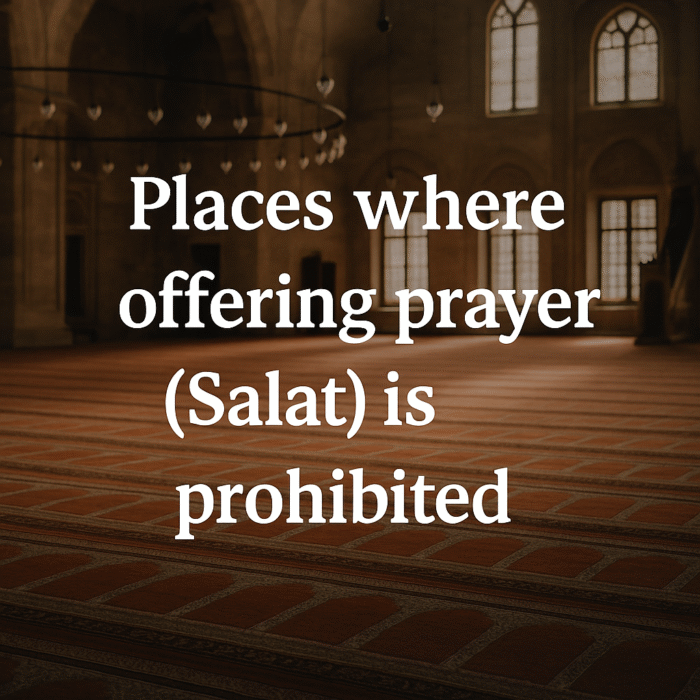Performing the five daily prayers on time is one of the key responsibilities of a Muslim. Regarding the timely performance of Salah, Allah the Almighty says: “Indeed, prayer is obligatory for the believers at prescribed times.” (Surah An-Nisa, verse: 103)
There is a promise of Paradise for performing the five daily prayers on time. The Prophet Muhammad (peace be upon him) said:
“Allah has enjoined five prayers upon His servants. Whoever performs them properly without neglecting any of them out of carelessness, Allah promises to admit him to Paradise. But whoever does not perform them properly, there is no promise for him from Allah. If He wills, He may punish him, and if He wills, He may forgive him.” (Sunan Abi Dawood, Hadith: 1420)
A pure place is required for prayer. One can pray in any pure place. The Messenger of Allah (peace be upon him) said: “The earth has been made a place of prayer and purification for my ummah.” (Bukhari, Hadith: 2977)
Even though prayers can be performed in any pure place on Earth, there are some places where prayer is prohibited. These places are:
Hazrat Ibn Umar (may Allah be pleased with them both) narrated that the Messenger of Allah (peace be upon him) prohibited praying in seven places: at garbage dumps, slaughterhouses, graveyards, paths used by people, bathhouses, camel pens, and on the roof of the Kaaba. (Tirmidhi, Ibn Majah)
Graveyard and Bathhouse-
Abu Sa’id Al-Khudri (may Allah be pleased with him) narrated that the Messenger of Allah (peace be upon him) said: “The entire earth is a place of prayer except for graveyards and bathhouses.” (Abu Dawood, Hadith: 492)
Camel Pens –
Prayer is not allowed in places where camels are tied. Bara’ ibn Azib (may Allah be pleased with him) reported that when the Prophet (peace be upon him) was asked about praying in camel pens, he said: “Do not pray in camel pens, for they are places of devils.”
Then he was asked about praying in sheep pens, and he said: “You may pray there, for they are places of blessing.” (Abu Dawood, Hadith: 493)
Places of Divine Punishment –
Prayer is not allowed in places where past nations were punished. Abdullah Ibn Umar (may Allah be pleased with him) narrated that the Messenger of Allah (peace be upon him) said:
“Do not enter the dwellings of those who wronged themselves unless you are weeping, lest what befell them befalls you too.” (Bukhari, Hadith: 433)
Ibn Umar (may Allah be pleased with him) said: When the Prophet (peace be upon him) passed by Hijr (the settlement of the Thamud tribe), he said:
“Do not enter the homes of those who wronged themselves unless you are weeping, lest you be afflicted with the same punishment that afflicted them.” Then he covered his head and moved quickly through that valley. (Bukhari, Hadith: 4419)
According to scholars, praying at places of punishment is prohibited. Imam Nawawi (may Allah have mercy on him) said: It is unanimously haram (forbidden) to perform prayer in places of divine punishment.
Busy Roads –
It is better not to pray on busy roads where people or vehicles move, as it causes discomfort to others. However, if it is on the side of the road and does not obstruct movement, prayer is allowed. Similarly, prayer can be performed on abandoned roads. In cases of necessity, such as space shortage during Jumu’ah or Eid prayers, it is permissible to pray on the road.
If it does not disturb public movement, prayer on the road is allowed. Abu Sa’id Al-Khudri (may Allah be pleased with him) narrated that the Messenger of Allah (peace be upon him) said:
“Beware of sitting in the roads.” The companions said, “O Messenger of Allah, we have no choice but to sit there. We discuss matters there.”
The Messenger of Allah (peace be upon him) said, “If you must sit, then give the road its due rights.”
They asked, “What are the rights of the road, O Messenger of Allah?” He said, “Lowering the gaze, refraining from harming others, returning greetings, enjoining what is right, and forbidding what is wrong.” (Bukhari, Hadith: 6229)

